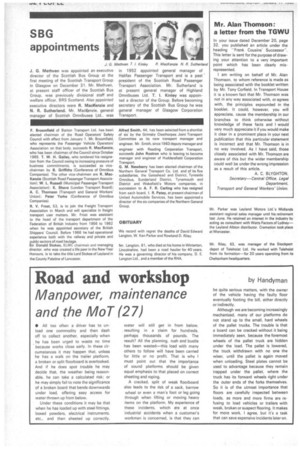Road and workshop
Page 34

If you've noticed an error in this article please click here to report it so we can fix it.
Manpower, maintenance
and the MoT (27)
by Handyman
• All too often a driver has to unload one commodity and then dash off to collect another, especially when he has been urged to waste no time because works close early. In these circumstances it may happen that, unless he has a walk on the trailer platform, a broken or split floorboard is overlooked. And if he does spot trouble he may decide that, the weather being reasonable, he can take a calculated risk; or he may simply fail to note the significance of a broken board that bends downwards under load, offering easy access for water thrown up from below.
Under these conditions it may be that when he has loaded up with steel fittings, boxed powders, electrical instruments, etc., and then sheeted up correctly,
water will still get in from below, resulting in a claim for hundreds. perhaps thousands of pounds. The result? All the planning, rush and bustle has been wasted—this load with many others to follow will have been carried for little or no profit. That is why I must point out that the importance of sound platforms should be given equal emphasis to that placed on correct sheeting and roping.
A cracked, split of weak floorboard also leads to the risk of a sack, barrow wheel or even a man's foot or leg going through when lifting or moving heavy items on the platform. My experience of these incidents, which a're at once industrial accidents when a customer's workman is concerned, is that they can
be quite serious matters, with the owner of the vehicle having the faulty floor eventually footing the bill, either directly or indirectly.
Although we are becoming increasingly mechanized, many of our platforms do not stand up to the small, hard wheels of the pallet trucks. The trouble is that a board can be cracked without it being immediately seen, because the foremost wheels of the pallet truck are hidden under the load. The pallet is lowered, the truck withdrawn with no one the wiser, until the pallet is again moved when unloading. Steel plates cannot be used to advantage because they remain trapped under the pallet, where the truck has its forward wheels right under the outer ends of the forks themselves. So it is of the utmost importance that floors are carefully inspected between loads, as more and more firms are refusing to load vehicles or trailers with weak, broken or suspect flooring. It makes for more work, I agree, but it's a task that can save expensive incidents later on.








































































































